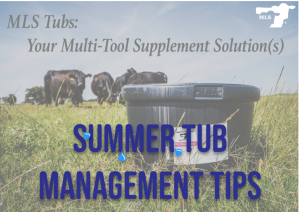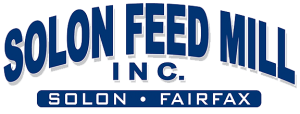Summer MLS Tub Tips
Summer MLS Tub Intake Management
Low-Moisture Tubs (LMT’s) like the MLS/Herd Manager product lines are a popular free-choice supplement that provides consistent low daily intakes and generally deliver less than 1 pound per head per day for grazing beef cattle. These supplements are manufactured by dehydrating molasses and then blending with dry ingredients to arrive at a specific nutrient profile for grazing livestock. Some formulations feature higher protein guarantees, while others feature a mineral/vitamin supplement depending upon what may be required.

MLS Low-Moisture Tubs have what is called, “cold-flow” properties, where it can physically flow under its own product weight. What this means for LMT’s is that they are physically hard at ambient temperatures but require a rigid container so that they hold their shape. This also means that as ambient temperatures increase during the heat of summer and/or persist over a number of days, LMT’s become more pliable and softer. Sunlight has significant impact on increasing surface temperatures of LMT’s. This means surface temperatures of the supplement can exceed 125 degrees on hot days. Cool nights will help bring product back to a hardness and rigidity that helps ensure typical intakes of less than 1 pound. However, extended periods of extremely high temperatures coupled with nights that do not cool appreciably, contribute greatly to LMT’s that are softer and can cause higher intakes if not implementing some of the recommendations outlined below.
The northern Great Plains has recently been experiencing these conditions earlier in the summer than usual in addition to producers facing increasing drought over a wide geographic area in the western and midwestern areas of the United States. Extreme temperatures and sunlight can influence physical properties of LMT supplements and when combined with limited forage availability supplement programs need to be monitored closely to meet intake expectations.
Handling, Storage and Feeding Tips for MLS/Herd Manager Tubs in Hot Weather
- Make sure tubs, plastic or degradable fiber are stored upright and that nothing is placed directly on the surface of the product.
- If hot temperatures persist, be sure tubs are not stacked more than two high to limit the weight on the bottom row of containers.
- Persistent heat will cause LMT’s to become more malleable and allow for potential shifting in storage for MLS tubs in either plastic or degradable fiber containers
- Keep containers out of the direct sun light in storage.
- Monitor stored product daily to look for changes in product or containers that may cause shifting.
- Pay particular attention to the bottom row of tubs that are placed directly on pallets as shifting can occur due to an uneven pallet surface
- Un-stack either plastic or degradable tubs if they are more than two levels high. Placing all containers at ground level is advised when storage conditions permit.
Feeding Tips:
- Make sure there is plenty of available forage in pastures. Once forage becomes limiting, supplement intake will most often increase.
- Be sure there are 20 to 30 head per tub for proper surface area exposure. Fewer animals per container could allow for increased daily intake.
- Place tubs further away from water or loafing areas once livestock are familiar with the supplement to decrease intake.
- If possible, position tubs in areas that receive shade during the day.
- LMT’s will normally soften with high temperatures. Shade will significantly reduce this softening and night cooling will return product to original hardness.
- Check your livestock frequently during extended periods of heat to make sure they have access to fresh water and MLS/Herd Manager supplement programs are delivering expected intakes. Repositioning tubs in the pasture may be needed to help reach desired intake.
- Common livestock management practices that can lead to higher LMT supplement intake include:
- Limited forage availability and/or a significant reduction in quality.
- Fewer than 20 to 30 head per container where they have access to more supplement surface area.
- Confined situations where cattle are in close proximity to supplement containers for most of the day.
- Placement of MLS/Herd Manager tubs in open, un-shaded areas near water.
- Allowing free-choice supplement access to starved animals that were previously restricted.
MLS and Herd Manager Low-Moisture tub products can be successfully fed under a wide range of grazing conditions including summer pastures. Long periods of extended heat have the ability to influence the hardness of the product, however, properly manufactured product can safely and predictably be fed. Drought conditions, storage conditions, modifications in container placement or stocking rates per container are important factors that should be considered when managing a summer LMT supplementation program.
